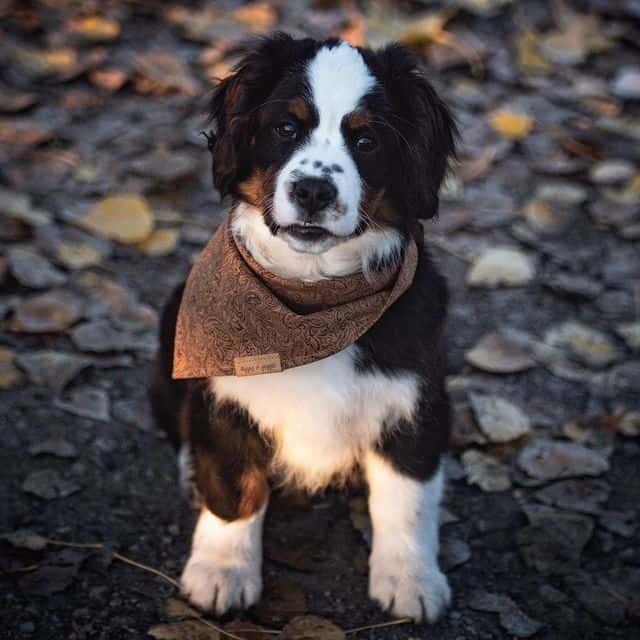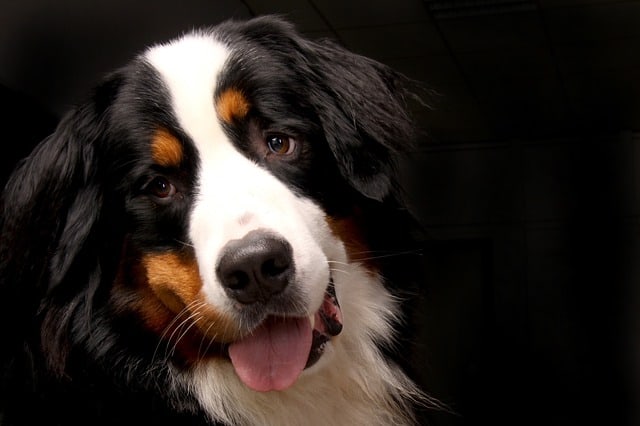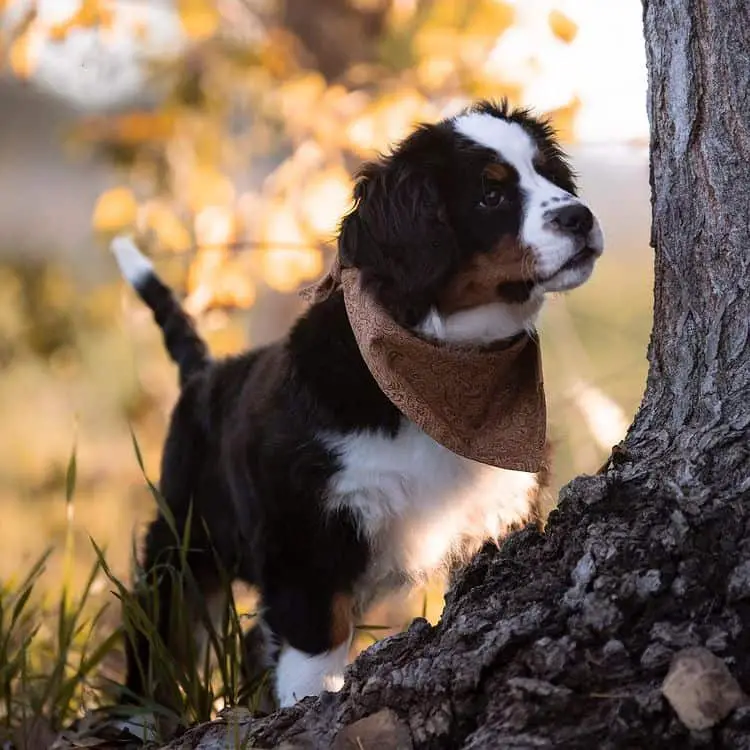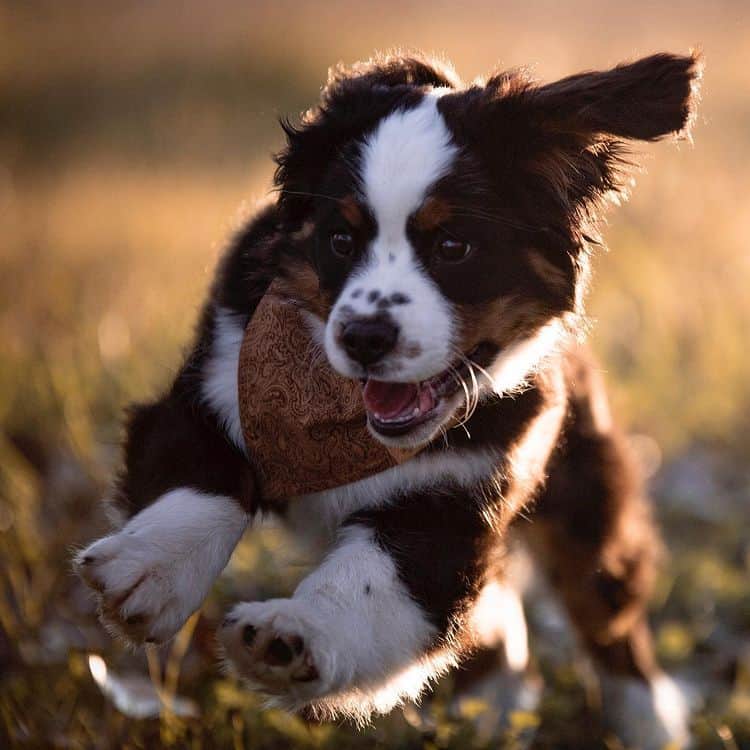We all know and love the gentle giants that are Bernese Mountain Dogs, affectionately known as Berners. They are highly intelligent, sweet-natured, loyal, affectionate — and notably huge!
As big, powerful, and hard-working farm dogs, the size and strength of Berners were highly useful to the farm owners in the snow-capped Alpine region of Switzerland where they hail from. When they made their way to the US and the rest of the world in the early 1900s, their amazing personality and demeanor made them popular as great pets and everyday companions. However, modern living, especially in small city dwellings as opposed to spacious farmlands can make these gentle giants just too big for many owners to handle and give them the highly active and energetic life that they deserve.
Enter — Mini Bernese Mountain Dogs!

Mini Bernese mountain dogs are an adorably compact version of the much-loved Bernese Mountain Dog. They offer all the beloved qualities and mannerisms of Bernese Mountain dogs without the complexities that come with their large size.
A Mini Bernese Mountain dog is a crossbreed between a purebred Cavalier King Charles Spaniel dog and a Bernese Mountain dog. Both breeds have fairly similar coloring, a silky coat, friendly mannerisms, and an adorable facial shape despite the size difference, making the result a cute smaller version of the strikingly handsome big Berners.
History of the Mini Bernese Mountain Dog
The parent breeds of these adorable miniature Berner pups have long and illustrious histories as our canine companions. Bernese Mountain dogs are smart and hardworking herding dogs. In the Swiss farmlands that they come from, they used to help with pulling carts and transportation due to their large and strong bodies.

Their ever-present calm disposition and the ability to stay unstressed even in extreme weather conditions made them good companions for farmers in cold Swiss uplands for thousands of years. In 1937, Bernese Mountain Dogs were recognized as a breed by the American Kennel Club. For well over a century now, they have been one of the most popular breeds all over the world.
Just like all Spaniels, Cavalier King Charles Spaniels are gentle and affectionate. They have a history of being beloved family dogs as well as lively hunting companions to nobility from the UK, where they hail from.

The history of the crossbreed of these two, that is the Mini Bernese Mountain dog, is not very long as it is not yet a recognized breed from the American Kennel Club. There are also the Bernedoodles — cross between a Berner and a Poodle —, but they do not quite qualify as a Miniature Bernese Mountain dog.
As long as your Mini Berner comes from a responsible and ethical breeder, they will live long lives being loyal, affectionate, and adorable family pets.
Looks and Personality
There is no particular breed standard or a “true” Mini Bernese Mountain dog that is recognized as the ideal as yet. However, the cross between a true full-sized Berner and a purebred Cavalier King Charles Spaniel dog results in a smaller pup that grows up to about 20 inches, which is close to a fully grown Cavalier Spaniel. That cross is what specifically we call a Mini Bernese Mountain dog.
They bear the signature tri-color coat of Berners with the distribution of the markings differing according to their parents. The weight of a fully-grown Mini Berner would be about 65 lbs, which is often less than half of the weight of their big Berner parent.
Mini Berners often carry the best qualities of both their parent breeds. They are incredibly loyal and affectionate like their Bernese parents, and they have the curious, playful, and eager demeanor of the Spaniels. Depending on their parents, they may have a notable prey drive, but chasing a squirrel in the park is likely as high as it goes.
To get a good idea of what the mini Bernese looks like, take a look at these photos:
Lifespan and Health
Mini Bernese Mountain dogs are generally happy and healthy dogs. The average lifespan of a mini Berner is around 8-13 years, which is around the same lifespan as its parent breeds. They are healthy, lively, resilient, and strong just like their parents. Just like any other crossbred pup, it is possible that they may inherit genetic or other health issues from their parent breeds, which is why it is important that you always go for a responsible breeder with a good reputation to get your Mini Berner puppy.
Check if your breeder offers a health guarantee before you agree to bring the pup home. Ultimately, as pet owners, you need to always pay good attention to the behavior of your dog in order to recognize any potential health issues early on and treat them well.
For example, keep a watchful eye to see if they tend to shake their head often, or if there’s any discharge coming from their ears, which is a sign of an infection. If you tend to go outdoors often, check for fleas regularly since it can cause not only scratching and red skin on the pup but also can lead to anemia and tapeworms if not treated well.
Some of the more serious health problems to look for in a Mini Bernese Mountain dog include;
This condition is a deformity that occurs during the growth stages of the pup. It is an abnormal formation of the hip socket which eventually leads to arthritis and decreased range of motion. Your vet may recommend surgery to fix the issue. The common symptoms include being wobbly when they walk and the difficulty to rise from a sitting or lying position.
This is a heart-related issue due to a weak or leaking mitral valve in the dog’s heart. Cavalier King Charles Spaniels are more prone to this disease, from where your Mini Berner may inherit them. The most common sign of this disease is a heart murmur, or a whooshing or a swishing sound in the heart. The progression of the disease may vary from one dog to another. With early detection and proper treatment, the pup may be able to extend its life for about two more years.
While there is no surefire way to avoid health problems in dogs altogether, a healthy diet, and an exercise routine with a lot of love would go a long way in keeping your Mini Berner pup happy and healthy for a very long time.
Caring and Grooming Needs
Just like their parent breeds, Mini Berners have a double coat, which means their coat consists of two layers — a dense undercoat with short hairs and a top coat with longer hairs. The inner coat keeps your Mini Burner cool during the summer and also toasty warm in the colder months. The topcoat repels moisture and dirt from getting in. If you are not used to having a pup with a double coat, you may have to brush up on your grooming skills, since they need regular and consistent grooming. If you leave longer periods between grooming sessions, it can lead to matting of both the outer and inner coats, which can be painful for the pup.
You should also be ready for the shedding that occurs once or twice a year, mostly around the spring and fall. If you have allergies, remember to be meticulous with the grooming during the shedding season, and wash your hands regularly. Keep your vacuums and the grooming kit ready during this time. You may have to groom almost daily during the shedding period. During the rest of the year, brushing 1-2 times a week would do, with a visit to a professional groomer once every couple of months. If the pup has a healthy coat and normal skin, bathing once a month is usually sufficient — unless they jump into a puddle of mud that is!
While Mini Berners are gentle little souls that tolerate grooming well, it is always good to keep the grooming time short to make the experience pleasant for both the pup and yourself. Gather all the tools including combs, brushes, and towels before you carry the pup to the grooming station. Start by combing the coat with your fingers to see if there are any mats or tangles. Be gentle when it comes to brushing, being careful not to pull hard on the hairs. If there is a tangle or a matted area, use a detangling brush to carefully split and remove them without pulling on them or cutting them off.
You should also brush their teeth to avoid getting plaque buildup which can lead to serious dental issues later in their life. Carefully trim the nails when your Mini Berner pup is relaxed and in a good mood, and make sure those cute ears are properly clean after every grooming session as well.
Feeding and Nutrition
The feeding habits and the nutritional requirements of Mini Bernese Mountain dogs lean more towards their Spaniel parent. If you prepare their food fresh, include a healthy combination of meat, grains, and vegetables. During the growth stage until about 6 months, Mini Berner puppies require plenty of proteins in their diet. At least 1/5th of their food should consist of proteins in order for them to have a healthy growth of bones, muscles, and cognitive abilities.
Look for sufficient amounts of proteins, vitamins, minerals, and fiber in the ingredients lists when you buy dry kibble or canned wet food. The statement, “… formulated to meet the nutritional levels established by the AAFCO Dog Food Nutrient Profiles” in the dog food label means it has met the strict requirements by the Association of American Feed Control Officials that it is in fact nutritionally balanced and complete for your Mini Berner pup. Have clean and fresh water available to them at all times. Check with your vet if you have any specific questions about your pup’s diet.
Adaptability
Mini Bernese Mountain dogs are smart, observant, and highly adaptable to their environment. Whether you live in an apartment, a home with a small backyard, or even a large farm, they know how to easily adapt to the requirements of where they live. They also do well with changing weather, but due to their double coat, they thrive in environments that are not too hot or too cold. They may take a few days, usually about a week or two, to explore their surroundings until they feel perfectly comfortable in them.
This is a process that should be rushed. Let them roam around and get to know the place they live in, and they will soon start feeling right at home regardless of the size or other factors of your living space.
A simple way to help your Mini Berner adapt to his or her surroundings is to develop a consistent routine of feeding, walking, playing, resting, and winding down for the day with your pup. This is also the time you should start slowly introducing the pup to your children, other pets, and basically anyone or anything that will be a regular part of their daily life.
The process of adaptability that your Mini Berner goes through is something that may not be entirely obvious to you at first. Be patient, observe, and help the pup as needed to explore its surroundings until they fully settle down.
Temperament

Just like their outward personality, Mini Berners are known for their sweet temperament as well. Temperament is the underlying nature of a pup, including the way they interact with the world around them as well as how they behave unsupervised. The overall temperament of a mini Berner is a beautiful blend of both their parent breeds.
They mirror the relaxed and chilled-out nature of their Berner parent as well as the lively and confident nature that comes from their Spaniel genes. This makes for amazing family pets. Their eagerness to please their owner, however, means that they do not like to be alone for long periods of time. You can be sure of a highly enthusiastic welcome when you come home to them.
It is also important to know that being highly affectionate family dogs, Mini Berners like to be around their family most of the time. Therefore, keep him company and around the family members as much as possible. If you leave the Mini Berner pups alone for long periods of time, it is likely that they may start showing undesirable behaviors.
Trainability
Mini Berners strongly exhibit the qualities of their Berner parent when it comes to trainability. Berners, in particular, are highly intelligent and trainable. They are sharp and quick to learn. They will not get distracted in the middle of training and will stay alert and observant which makes it really easy to train them. The key to a well-trained pup is early obedience and socialization training. You can start training them with simple obedience commands as young as 7 to 8 weeks of age.
Starting their training young will help set a strong foundation before any formal dog training you plan to put them through. Mini Berners respond well to positive reinforcement. Being intelligent pups, their feelings can get hurt if you try to use any harsh training methods, which will make an easy task unnecessarily hard.
Approach training a Mini Berner with patience and lots of love. Their natural tendency to please you will help with the training. Keep the commands short, direct, and clear. Give lots of treats and praise once they correctly respond to a command, and they will learn very quickly.
Your training sessions should be short in the beginning so as not to overwhelm the pup. You can gradually extend them as their attention span grows for the best results. This will keep them excited for the next session, and the training will be more efficient and effective.
Energy Levels and Physical Needs

Mini Berners love the outdoors. Their energy level is rather moderate and manageable. They are playful and would love to run around in the dog park, but not as much as the full-sized Berners who are giant balls of energy with massive strength made to be consistently hard-working dogs. A good rule of thumb is to leave about one hour a day to go on walks and tend to the energy and exercise needs of a Mini Burner. If you have a busy schedule, you can break down the one hour into several sessions as well.
A nice long walk or a game of fetch will help use up their energy and they will let you know when they are ready to go back home for a snooze. If you are an outdoorsy person, the Mini Berner pup would make a great companion on your hikes or camping trips. The more you get to know your pup, the more you will understand their individual energy level and physical needs. Regular and consistent exercise will keep your Mini Berner fit, healthy, and happy for a long time.
Children and Other Pets
The sweet and gentle personalities of Mini Berners make them great with children as well as other pets you may have. They like to make friends and are affectionate towards everyone. While a full-sized Berner would bring risks such as unintentionally knocking over a child due to their size even with their sweetest temperament, you will not have that risk with a Mini Berner. They inherit the patience and calm from their gentle giant parents, and their size works especially well for families with small children.
Another beloved quality of Mini Berner dogs that make them great family dogs is that their energy level is just enough to keep up with the high energy of children, but not too much that it would lead to annoying behavioral problems. The playtime would be great in your family with a Mini Burner pup in the mix, and once the playtime is over, they will be ready to have dinner and wind down like the sweet good pups they are!
To make sure your new Mini Berner gets along well with your children and other pets, it is good to set up a meet and greet between them before you bring the pup home.
Drawbacks and How to Avoid Them
Mini Bernese Mountain dogs are still not a recognized breed. Just like in any crossbred dog, there are health and other issues that can affect them which we may simply not know. As mentioned above as well, going for a responsible breeder with a great reputation should resolve many drawbacks that may come with this breed.
Some unethical breeders may have malnourished the parent dogs to achieve the desirable small size, which, besides being a horrible thing to do, can lead to many health issues in the puppies. Visit the breeder and see how the puppies and the parent dogs are housed and treated. Make sure the parent dogs are purebred and in great health before you bring your Mini Berner home. Meeting them will help you understand the personality and temperament of the puppies as well.
Mini Bernese Mountain Dog Puppies Price
If after reading all of this and looking at the beautiful pictures you’ve decided that a mini Bernese would be a welcome addition to your home you’re naturally wondering how much these cute animals cost.
The price depends highly on your location, some areas have many mini Berners for sale, while in other areas they’re hard to find, driving the price up. On average though, expect to pay somewhere in the range of $2000-$3000 for a miniature Bernese Mountain Dog.
Final Thoughts
Mini Bernese Mountain dogs are a great example of when we say good things come in small packages. They are a sweet little bundle of all the good qualities you want in a pet such as being affectionate, loyal, obedient, and intelligent in many ways. The smaller size makes them friendlier to living in cities and smaller spaces as well. If you are a novice owner or you want a canine friend for your children, a friendly Mini Berner pup is a good choice to go for.
Mini Bernese Mountain dogs are cute with a sense of regal grace, playfulness, and sweet temperament that they inherit from their Bernese and Spaniel parents. Their wagging tail, the happy gleam in their dark eyes, and the adorable enthusiasm with which they greet everyone they encounter would always be a joy to come home to.
- How Long Do American Eskimo Dogs Live? Important Factors and Care Tips - September 29, 2023
- Do American Bulldogs Need Grooming? Essential Tips and Care Guidelines - September 29, 2023
- Do Bengal Cats Enjoy Playing? Essential Tips for Keeping Them Active - September 29, 2023